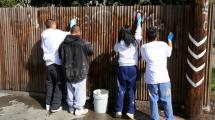Youth who receive special education services under the Individuals with Disabilities Education Act (IDEA 2004) and especially young adults of transition age, should be involved in planning for life after high school as early as possible and no later than age 16. Transition services should stem from the individual youth’s needs and strengths, ensuring that planning takes into account his or her interests, preferences, and desires for the future.
Family Conflict and Violence
Youth experiencing homelessness and youth who have runaway consistently identify family conflict as the primary reason for homelessness and they experience more conflict at home than their peers.1 A youth’s sexual orientation, school problems, pregnancy, and substance use have been identified as primary risk factors for family conflict or disagreement.2
-
Interviews with 215 young people (ages 13–25) in five U.S. counties found that most youth identify their first spell of homelessness growing out of volatile or unsafe family contexts that continually evolve and erupted into parental rejection, getting kicked out, or fleeing family conflict.3
-
Of young people (ages 14–21) served by the Runaway and Homeless Youth Street Outreach program, seven of 10 reported they could not go home, with the biggest reason being their parents’ unwillingness to have them return or the existence of family conflict.4
Family interventions use prevention, reunification, and reconnection efforts to minimize family conflict and violence include family and individual therapy, parent education about adolescent development, assessment of family issues, conflict mediation and resolution services, and referrals to community-based supports.5
Resources
Homelessness Programs and Resources
The Homeless and Housing Resource Center, supported by the Substance Abuse and Mental Health Services Administration, shares state-of-the-art knowledge and promising practices to prevent and end homelessness through the following:
-
Training and technical assistance
-
Publications and materials
-
Online learning opportunities
-
Networking and collaboration
Family Interventions for Youth Experiencing or at Risk of Homelessness (PDF, 107 pages)
This report summarizes existing evidence on family intervention strategies for youth experiencing or at risk of homelessness, as gathered through a literature review and supplemented with conversations with a small set of key informants.
-
List of Evidence-Based, Evidence-Informed, and Promising Family Interventions for Youth Experiencing or at Risk of Homelessness. This chart lists the family intervention practices identified in the full report above that met the criteria for evidence-based, evidence-informed, and promising programs.
-
List of Emerging and of Interest Family Interventions for Youth Experiencing or at Risk of Homelessness. This chart lists the family intervention practices identified in the full report above) that met the criteria for emerging and of interest.
Family Violence Prevention and Services Act (FVPSA)
The FVPSA funds the federal response system to ensure vital crisis services and shelters are available to individuals experiencing domestic or dating violence and their dependents. The Office of Family Violence Prevention and Services (OFVPS) administers FVPSA funding and grant programs to implement statutorily required services for the purposes of the following:
-
Providing immediate shelter and supportive services for individuals experiencing domestic or dating violence and their dependents
-
Increasing public awareness and primary prevention of domestic and dating violence
-
Operating a national domestic violence hotline
-
Providing specialized services to abused parents and their children
Providing technical assistance and training relating to domestic and dating violence to local public agencies, nonprofit organizations, tribal organizations, and others, including the establishment of state domestic violence coalitions and national resource centers Through its grant programs, OFVPS puts the power to effectively address the prevalence of domestic violence into the hands of the community and supports their efforts to strengthen community-based services, while also funding prevention and public awareness efforts. These programs provide both a safe haven and an array of supportive services to intervene when help is needed and to prevent abuse. FVPSA grant programs include the following:
-
Love is Respect. This project of The Hotline is tailored for young people as an initiative that engages, educates, and empowers young people to prevent and end dating abuse. It was established in 2007 (as the teen dating abuse helpline) in response to the national discourse about the need for prevention services, especially among teens. Our work is youth centered and based on their real-life experiences.
FVPSA RHY Relationship Violence Toolkit
This toolkit was developed by and for advocates in the runaway and homeless youth (RHY) and domestic and sexual assault (DV/SA) fields to help programs better address relationship violence with runaway and homeless youth. The toolkit organizes information, resources, tips, and tools drawn from the wealth of information gathered when the two service systems were convened through local collaborative projects funded by the Family and Youth Services Bureau of the U.S. Department of Health and Human Services.
Chapin Hall: Young People Experience Significant Disruption and Loss Both Before and During Their Homelessness
This report from Chapin Hall discusses findings from the largest qualitative study done with youth experiencing homelessness, looking into the hardships that occur before and during homelessness.
Housing Assistance for Individuals Who Have Experienced or Are at Risk of Human Trafficking
The Administration for Children and Families (ACF), Office on Trafficking in Persons (OTIP), funds state, local, and tribal governments, plus nonprofit and tribal organizations, to provide direct services, including assistance with housing, for individuals and certain immediate family members who have experienced or are at risk of human trafficking. Recipients must conduct targeted outreach and comprehensive case management services that include helping clients navigate systems of care, direct services, and/or community referrals.
National Human Trafficking Hotline
The OTIP funds the National Human Trafficking Hotline, a 24/7, confidential, multilingual resource that provides information and service referrals to emergency shelters, transitional housing, and long-term housing for people at risk for, currently experiencing, or who have experienced human trafficking.
Housing and Economic Mobility Toolkit
The OTIP Housing and Economic Mobility Toolkit contains four documents intended to provide guiding principles for serving survivors of human trafficking, strategies for developing community partnerships, and clarification about survivors’ eligibility for existing housing resources.
Federal Housing and Economic Mobility Resources
The OTIP published this information memorandum to provide an overview of federally funded programs, training, and other resources to increase access to housing and employment for people who have experienced human trafficking.
Housing for Foreign National Children and Youth who have Experienced or are At Risk of Human Trafficking
Foreign national children in the United States, including unaccompanied children, are eligible to apply for the Public Housing Program and Housing Choice Voucher Program to the same extent as a refugee if they receive an Eligibility Letter or Interim Assistance Letter from the OTIP certifying that they have or may have experienced human trafficking at any point in their life and in any country. Anyone can submit a Request for Assistance to OTIP on behalf of a foreign national minor who they suspect has experienced human trafficking, although federal, state, and local officials are required to refer concerns for potential trafficking of foreign national minors to OTIP within 24 hours.
References
1 National Alliance to End Homelessness, n.d; National Conference of State Legislatures, 2023
2 Congressional Research Service, 2019; Pergamit, Gelatt, Stratford, Beckwith, & Carver Martin, 2016
3 Samuels, Cerven, Curry, Robinson, & Patel, 2019
4 University of Nebraska–Lincoln, 2016
5 Pergamit, Gelatt, Stratford, Beckwith, & Carver Martin, 2016
Other Resources on this Topic
Agencies
Announcements
Collaboration Profiles
Data Sources
Feature Articles
Programs
Publications
Resources
Technical Assistance
Tools & Guides
Websites
Youth Topics
Youth Briefs
Research links early leadership with increased self-efficacy and suggests that leadership can help youth to develop decision making and interpersonal skills that support successes in the workforce and adulthood. In addition, young leaders tend to be more involved in their communities, and have lower dropout rates than their peers. Youth leaders also show considerable benefits for their communities, providing valuable insight into the needs and interests of young people
Statistics reflecting the number of youth suffering from mental health, substance abuse, and co-occurring disorders highlight the necessity for schools, families, support staff, and communities to work together to develop targeted, coordinated, and comprehensive transition plans for young people with a history of mental health needs and/or substance abuse.
Nearly 30,000 youth aged out of foster care in Fiscal Year 2009, which represents nine percent of the young people involved in the foster care system that year. This transition can be challenging for youth, especially youth who have grown up in the child welfare system.
Research has demonstrated that as many as one in five children/youth have a diagnosable mental health disorder. Read about how coordination between public service agencies can improve treatment for these youth.
Civic engagement has the potential to empower young adults, increase their self-determination, and give them the skills and self-confidence they need to enter the workforce. Read about one youth’s experience in AmeriCorps National Civilian Community Corps (NCCC).






